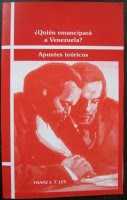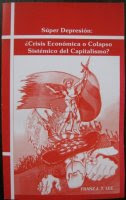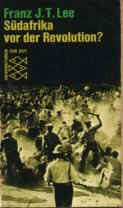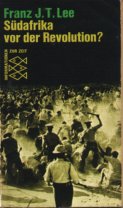Venezuela, Will we cast our vote for the French Revolution or for the Paris Commune?
By Franz J. T. Lee
On the eve of the parliamentary elections in Venezuela which will take place next Sunday, September 26, 2010, it is pertinent to ask whether Bolivarian Socialism still considers the class struggle as an anti-capitalist transhistoric necessity.
Do 'socialist' democratic elections form part of the current violent class struggles on a global scale, inter alia, in Iraq, Afghanistan, China, Greece, France, USA, Palestine, Gaza, Cuba, Bolivia, Colombia or South Africa? Is the Great Depression or the Mega-Recession part of global class struggles? These are theoretical, philosophic questions which yearn for praxical answers.
However, especially for our Venezuelan comrades, for the Socialist United Party of Venezuela (PSUV), we will just illuminate dialectically just some aspects of the concepts 'class' and 'struggle'.
Why?
Generally it is not known that if something loses its negation, its opposite, it also begins to perish. If socialism as a possible mode of creative emancipation cannot be materialized on a world scale, out of necessity capitalist reality will also perish. After the 'communist' hoax failed, now desperately world imperialism is trying to create an artificial negation, a black sheep, Bin Laden, terrorists, etc. Similarly, socialism as Negation of capitalism has to transcend, otherwise it will also perish in Orwellian, capitalist barbarism.
Not everything that is called socialism necessarily is radical anti-capitalism. We do not have an easy task of creating human emancipation!
Always the Venezuelan government, especially President Hugo Chavez himself, points out that the 'socialist revolution' in Venezuela is 'peaceful' but, at the same time, it is an 'armed' revolution. In other words, we in Venezuela have our own particular ideas about peace or arms, also our own meanings of 'socialist revolution'; we make and think a socialism and a revolution sui generis.
So far, so good.
Venezuela has the birth right, the sovereignty, to liberate and emancipate herself as she pleases. Elsewhere we should practice this free self-determination. Emancipation starts at home, or in the fight, in the class struggle to obtain a home, a true motherland, a real "Matria", a decent, humane, human Life.
However, when it comes to learning from other social revolutions the matter is different. Among other things, if we study the Paris Commune, the October Revolution, the Chinese Revolution, the Vietnam Revolution, the Cuban Revolution and the Revolution of Guinea Bissau, we discover that all of them could not escape the profound, violent contradictions of modern history, of the history of class struggles. For centuries, we did not invent violence, we are born into, live in and will die in capitalist violence, of which the State has the monopoly. In Venezuela, the 'Caracaso' is an example; lately Faluja and Gaza were other examples of fascist State violence, verification of the international class struggle.
In dialectics, in knowledge and truth, it takes at least two to tango the violent class struggle, a terrorist, atheist, opulent master and a docile, lean, genuflecting slave; in the last analysis, dialectically their social relation form the inexorable class struggle.
Now, let us activate our theoretical neurons and look at the concept 'class struggle' in a more profound manner.
What is the historic, philosophic context of class struggle, seen as the dynamic, dialectical generator of labor, capital, competition, concentration, accumulation and globalization? More precisely for us, for Humania South, for Venezuela, class struggle concerns economic exploitation, political domination, social discrimination, military genocide and total dehumanized alienation.
Let us answer some of these significant questions in a very simple manner. This does not mean that we will resort to simplistic jargon. On the contrary, simplicity, as class conscious action, is the social mother of emancipatory beauty.
What is struggle?
Scientifically, what do concepts like 'fight', 'conflict', 'strife', 'antagonism', 'revolution', 'contradiction' and 'war' denote? Over two and a half millennia ago, the dialectical key to open this bellicose Pandora Box was already presented to us by a famous hylozoistic, materialist philosopher of Greek Antiquity, by Heraclitus of Ephesus.
In the closed, geocentrist, formal logical slave-holding world order, determined and defended by the two systemic, philosophic titans, Plato and Aristotle, "agon", strife, motion and "sphairos" repose, rest ... governed the 'cradle of civilization'. The two systemic, philosophic guardian angels formal logically counterpoised 'A' and its derivation 'Non-A'. The whole world of antiquity was dancing 'two step', only two possibilities were accepted as being socially 'correct': good and no-good, truth and no-truth, that is, these were the only two sides of 'absolute truth'. The ruling class struggle was directed against contradiction, against political resistance, against dialectics. Already during the age of Thales of Miletus, of the founder of philosophy, rebelling slaves were already burnt at the stake. The class struggle of the exploited slaves was yearning for the Christian dissension, for Luciferean heavenly fire.
Till today, working class contradictions, relations, that is, true thinking and real thought are all suppressed or forbidden. Freedom of thought, of speech, are myths. Surely, one can freely think what one feels like, however, one should just not voice it, not say it aloud! For wage slaves, in the superstructural, ideological class struggle, dubito, cogito, ergo sum, I doubt, I think, therefore, I am, is not valid. And yet, the Marxist philosopher of Hope, Ernst Bloch, affirming global class struggle stated categorically: Denken heisst Überschreiten, Thinking is Venturing Beyond.
In reality, in the ideological superstructure of simple accumulation of capital, in the ancient Greek poleis, city-states, for example, in Miletus and Lydia, philosophically a universal mind and thought control, a Mental Holocaust, was already launched against any physical or intellectual resistance coming from the under-dog toiling classes. In no way this is different today, quod erat demonstrandum, in Apartheid South Africa, Nazi Germany, Iraq, Afghanistan and Gaza.
Parmenides of Elea postulated the hen kai pan, the eternal one and only, the future coming Roman Catholic God (A). This expresses the perverse, unilateral relation Ruling Society versus Exploited Nature, the labor process, class struggle, history.
On the other hand, Heraclitus postulated everlasting motion, his panta rhei, his 'everything flows' (Non-A).
Both philosophies together form dialectics, a contradiction, a struggle, motion; they form two antagonistic sides of the same thing, of (A). Internally, in (A) rages a merciless class struggle, dialectics.
Concerning the current international class struggle against world fascism, what does this mean?
Concretely, this means that the following are two sides of the very same thing, of the same process: revolution and counter-revolution, the French Revolution and the Paris Commune, the February Revolution and the October Revolution in Russia. One is pro-capitalist (A), the other is pro-socialist (Non-A).
Surely, according to President Chavez of Venezuela, the Bolivarian Revolution is anti-capitalist, is directed against North American imperialism. Obviously, global capitalism is imperialism and imperialism is global capitalism. The modern social father (the 'Patria') of capitalism is the agonizing French Revolution, logically, the future natural mother (the 'Matria') of socialism is the living Paris Commune.
The above we have to bear in mind when we go to the polls next Sunday.
Next Sunday, will we cast our vote for the French Revolution or for the Paris Commune?
For Orwellian Barbarism or Human Socialism? Are we for the flowing river of life or are we already peaceful, resting in peace?
Concerning the above, Heraclitus himself confirmed: 'Change alone is unchanging'. In other words, eternal Rest and everlasting Motion are identical things. The class struggle is history, is the labor process, is exploitative production. Creation, creativity and emancipation are made of other kinds of galactic star dust. About this more in a next commentary.
Ruling ideas became the ideas of the ruling classes; via 'ideas' the class struggle entered the philosophic domain.
In his doctrine of ideas Plato elevated the One of Parmenides to sublime heights, to the summum bonum, the 'Highest Good', to total 'Rest', to 'Rest in Peace'. Later the neo-Platonists and religious Stoics gave it a more simple theologian magic touch. As part of the bourgeois heliocentrist enlightenment, formal logical mind and thought control, obsolete feudal structures, expressed as religion, credos, catechisms, beliefs and revelations, were tumbled by Reason, by the objectivist, dialectical Absolute Idea of G. W. F. Hegel, by the weltgeist, by advancing, struggling Capital.
On the other hand, like elsewhere in Arabia, Africa or China, very early the pre-Socratic panpsychic philosophers were trying to introduce dialectics, the science of motion, into ancient European thought. The philosophic materialist tradition of Heraclitus, as negation of Platonic idealism, went across Arab-African philosophers to medieval Italy, and as part of the Renaissance entered bourgeois mechanical materialism, into modern capitalist production, globalization, patriarchal world wars and genocidal human extinction.
Heraclitus gave us two more keys to create openmindedness, to understand universal, historic class struggles.
Firstly, he explained the patriarchal, bellicose essence of our world order: "War is the Father of All Things". Therewith he elevated Struggle to a central dialectical concept. Intrinsically, in everything alive, in motion, is strife, is a dynamo (possibility). However because of systemic limits, because of the closed universal cage, possibility (Negation) is limited to a class reality (A). Motion, Change, can only come from within, by means of 'peaceful' ways. Anything (B or Z) that goes beyond Parmenides and Heraclitus, beyond (A) and (Non-A), beyond rest and motion, simply is denied any existence. It is forbidden to think or act anything that is not (A) or (Non-A). Anything that goes beyond the third law of formal logic (and of dialectics) is 'terrorism' or 'communism'. Capitalist Education and Socialization are the age old butchers of dialectics, of contradictions, of Life.
The corporate and imperialist ruling classes, who as a small elite, monopolize private property, capital, violence and power, as an international global and globalized ruling class, are armed to their teeth, and in Iraq, Afghanistan, Palestine and Gaza they annihilate brutally any struggle of the oppressed outcasts, of the modern exploited 'speaking tools'. This herrenvolk discriminates minorities, gypsies, Marxists or 'camel-drivers'.
Never in the process of capitalist production, of modern history, was class struggle so continental and international as at the beginning of this millennium. In fact, historic reality reveals that class struggle in an island, in one country, in a region, on a single continent, is not enough. Capital, capitalism is global, is globalized, hence, its negation, class struggle, socialism, has to be worldwide.
Barbarism is already worldwide; our Hobson's choice, as a meager possibility, is now either global socialism or human extinction.
Finally, what did Heraclitus advise us to do in such an apocalyptic super-depression and mega-recession, in the epoch of the global collapse of capitalism?
For what exactly Venezuela will be voting the coming Sunday?
Heraclitus, across 25 centuries advises that it should be 'voted' by the workers for the Truth, by means of global Praxis and Theory, that is, by means of human emancipation. Nothing really new can become obsolete, out of date, neither Jose Marti nor Simon Bolivar, neither Marx nor Rosa Luxemburg.
Heraclitus has the last word:
'To think healthy is the greatest perfection;
Wisdom is to tell the Truth, to act according to Nature, to listen to her.'
*****
--
 Our English Twitter
Our English Twitter
 Nuestro Twitter en Español
Nuestro Twitter en Español



















